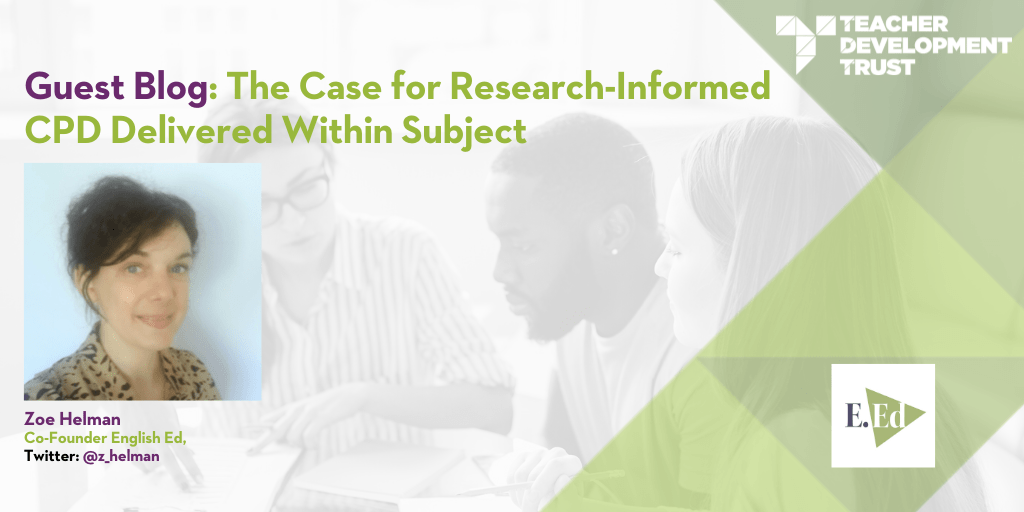For much of my teaching career, I knew very little about educational research. I seemed to survive pretty well without it. Like a lot of teachers, I achieved good results and was well-respected by my colleagues. I might even have been tempted to argue that we can learn everything on the job – teaching is oft described as a craft, after all.
However, what I have learned is that research can really help us understand more about why things do or don’t work in the classroom, developing our conscious competence so we can play to our strengths.
Of course, research has its limitations, but without it we don’t even attempt to give ourselves an objective window through which to see education. Too often we impose our political and ideological beliefs on our pupils, without meaning to or even realising, when we should be basing what we do, as objectively as possible, on how pupils actually learn. Evidence, carefully explored, is a useful way to undertake a thoughtful, nuanced, professional dialogue.
Why does research sometimes have a bad rep?
There are probably three main ways that research comes unstuck and gets itself a bad name. The first is that the research itself is poorly conducted and/or results are poorly interpreted. This problem is usually called out by other researchers in the fullness of time but by then misconceptions may have been embedded within the teaching community that can be very hard to shift. (Learning styles is a good example of this.) That doesn’t mean that science cannot be trusted. It means we have to be careful about rushing into things and understand that science is an unfolding journey, not a destination.
The second problem occurs when someone in a school or training organisation interprets research too simplistically and, firmly placing all their eggs in one basket, projects that simplified version to teachers as if it is fact, a panacea, the only way to teach. But the pointers we get from research are just that; they’re pointers. They are important, certainly, but they are not the full story. Nuance is necessary. Different approaches can work in different contexts. There is no one way to teach.
The third problem concerns poor implementation. Change is tough and often we rush to implement strategies we haven’t yet made sense of. The pressure to ‘fix’ things in record time can feel unsurmountable but we really have to resist. We must do all that we can to avoid the ‘cycle of planned failure’. Even where useful, well-conducted research had been well understood by an SLT, much can go wrong in how the ideas that come from that research are communicated to teachers. A major cause of confusion and disillusionment might come from the fact that very little research-informed CPD is also subject-specific.
Why does subject specificity matter?
The TDT review into developing effective CPD and a follow-up review by the Wellcome Trust
have both shown that subject specificity improves the quality and impact of CPD provision.
My own participation in the recent CPD Quality Assurance Pilot commissioned by the Wellcome Trust has served as a practical example of how difficult it can be to really conceptualise how research might be interpreted and used meaningfully by professionals working within a subject that falls outside your own personal expertise. It takes rigorous discussion and exemplification which, while useful, is certainly time-consuming.
It’s interesting to think about why this should be the case and there are likely a number of underlying factors. Firstly, expert knowledge is domain specific. While I might know quite a lot about current research, I am not an expert in applying it specifically within, say, mathematics. For example, I can make educated guesses as to what retrieval practice might look like in maths but the picture is hazy simply because I have been teaching English, not maths, for the last 20 years.
Part of being a subject specialist is exploring abstract, underlying subject concepts with our pupils. Those abstract concepts need some level of concrete exemplification in order to help pupils see the underlying concept, find patterns and make meaning. An actual maths teacher has built up years of, (perhaps subconscious, tacit) knowledge about the concepts pupils need to know, concrete examples that help pupils make sense of them, and likely misconceptions teachers will need to address. It’s difficult for a non-specialist to tap into that to help teachers understand and apply research because we simply don’t know enough.
To make things more complex, research itself is abstract. Teachers need clear, recognisable examples to help them to make meaning, just like pupils do. When a non-specialist tries to make a principle from research, let’s say cognitive load theory, make sense to a maths teacher, it falls apart because our exemplification isn’t good enough. The trainer ends up drawing either on examples from within their own subject, which might have little to do with maths, or, they take the scattergun approach of picking a handful of examples from across subjects in the hope that something within the mix will make sense to all participants. All too often, it doesn’t. That isn’t because there is something wrong with the trainer, it is simply the nature of the beast. We’re making teachers imagine abstract research principles within abstract subjects and there isn’t really any concrete exemplification.
This can be compounded by the fact that research by Berliner suggests many teachers aren’t clear about what the underlying concepts in their own subject actually are. English is a good example of a subject which is so vast and complex, it’s hard to pin down what the heart of it is (although my colleague and I have tried in our new book!) It means teachers often leave training sessions feeling like they haven’t learned anything that can help them, or thinking they have but then being unable to apply it.
Generic CPD has its merits, especially in terms of introducing something new which can then be followed up later within departments. But unless some subject-specific coaching or other training from an expert subject teacher is introduced, generic training may fail to have sufficient impact.
It doesn’t have to be that way. With carefully curated, thoughtful, evidence-informed and subject-specific CPD, we really can improve education. It is my hope that the momentum that seems to be building within our sector will steer us in the right direction.
Zoe Helman is Co-Founder of English-Ed (www.english-ed.co.uk) and co-author of a book about concept-led curriculum and evidence-informed CPD within English due to be published by Routledge in autumn entitled The Trouble with English & How We Can Address it: a practical guide to implementing a concept-led curriculum.
School Improvement through People Development
At the Teacher Development Trust, we work with schools to create the conditions to learn with each other, and from each other. Through our TDT Network packages we train senior and middle leaders (including department and subject leads) in the effective leadership of CPD and pedagogical coaching approaches. Our unique diagnostic review framework assesses current staff perceptions about various aspects of CPD in your organisation – including subject-specific CPD – and supports you to make targeted improvements to your processes, structures and culture of professional learning. To enrol your school or trust in membership, visit www.tdtrust.org
References
Berliner, D.C. (1988) The Development of Expertise in Pedagogy (Report). AACTE Publications.
Cambridge Assessment (2017) A Cambridge Approach to Improving Education [PDF] Available at https://www.cambridgeassessment.org.uk/Images/cambridge-approach-to-improving-education.pdf <Accessed on 10th May 2021>
Cordingley, P. et al (2018) [PDF] Developing Great Subject Teaching.
Available at https://wellcome.org/sites/default/files/developing-great-subject-teaching.pdf <Accessed on 10th May 2021>
Higgins, S. Coe, R. Cordingley, P. & Greany T. (2015) Developing Great Teaching Lessons from the international reviews into effective professional development. Available at https://tdtrust.org/about/dgt/ <Accessed on 10th May 2021>
Kirschner, P.A. (2017) Stop propagating the learning styles myth, Computers & Education, Volume 106, Pages 166-171. Available at https://doi.org/10.1016/j.compedu.2016.12.006.
The Learning Scientists (2018) Concrete Examples. Available at https://www.learningscientists.org/learning-scientists-podcast/2018/1/3/episode-10-concrete-examples <Accessed on 11th May 2021>
Chedzey, K., Cunningham, M. and Perry, E. (2021) Quality Assurance of Teachers’ Continuing Professional Development: Design, Development and Pilot of a CPD Quality Assurance System. Available at https://chartered.college/quality-assurance-of-teachers-continuing-professional-development/ <Accessed on 17th May 2021>


